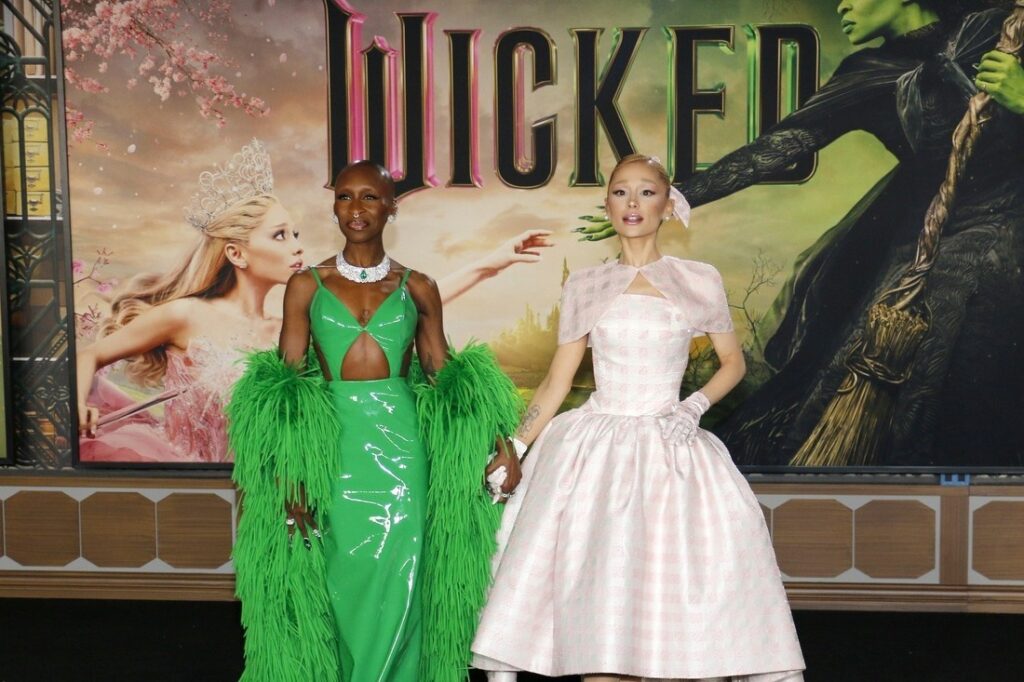At its heart, the movie Wicked is a story about marginalization and allyship. This really isn’t much of a surprise, considering the book was written by a gay man (Gregory Maguire), the musical was written by Winnie Holzman and composed by Stephen Schwartz, both of whom are Jewish, and most recently, the movie was directed by an Asian-American man (Jon M. Chu). Every iteration has added deeper nuance to the story’s message, helping to create a narrative that resonates with a huge variety of marginalized identities.
One scene, in particular, has been creating a buzz online—the dance in the Ozdust Ballroom. Egged on by her friends, Glinda gives Elphaba an ugly pointed hat to wear to the party and claims it’s a gift from the “goodness of [her] heart.” Taking Glinda at her word, Elphaba responds with a gift of her own—access to the sorceress lessons that Glinda has been desperate to join. Just as Glinda learns of this, Elphaba arrives at the Ozdust wearing the hat Glinda gave her and is immediately laughed at by her fellow classmates. Instead of running or hiding, Elphaba takes to the center of the dance floor and makes up a dance alone, seemingly ignoring the lack of music and ongoing taunts of her peers.
This is one of those moments that’s impossible to look away from because, chances are, you can find yourself somewhere within it. Whether it’s being the butt of the joke, the regretful prank-puller, or one of the many bystanders, all of us have likely experienced cruelty in a social setting.
One thing that stood out to me in this scene was what a perfect example it was of how complex (but important) it is to be an intentional ally to those with less privilege than you. Every character reacts to this scene in a way that is less than perfect, but also deeply human. I spoke with career coach Nikki Innocent about ways that these characters can serve as a learning tool for those who are seeking to be better allies to those around them.

What makes a workplace ally ‘good’ vs. ‘wicked’?
Here’s the thing about being an ally to someone with marginalized identities—your actions have to be about them, not you. If you are most concerned with what others think of you, it’s a pretty good sign that you’re being a performative ally.
According to Innocent, “Most acts of allyship on their surface can be categorized as performative if you are only willing to go so far as your comfort level and depth of empathy allows you.” She adds, “True allyship is uncomfortable. It is taxing and it often causes you to lose some of your privilege.”
Fiyero: The problem with ‘Dancing Through Life’
Though Fiyero does seem to be impressed by Elphaba’s bravery at the Ozdust, his comment that Elphaba “doesn’t give a twig what anyone thinks” shows how clueless he really is. This is driven home by Glinda’s response: “Of course she does. She just pretends not to.”
Innocent describes Fiyero as “more of a voyeur and a commentator” in this scene than any ally, representing “a stereotypical, very privileged, straight, cis, het, wealthy, white man” who is truly “blind to the dynamics at play.” When Elphaba’s actions begin to open Fiyero’s eyes to the reality around him, he begins to change.
Being ignorant of injustice doesn’t give anyone a pass—instead, it should serve as a catalyst for change. Every ally starts somewhere, and educating yourself is the first step. Despite starting with the least awareness of Ephaba’s reality, Fiyero ends the musical as one of her strongest allies. The key for him is the same as it is for those of us in the real world—listening and learning from those already doing the work.
Nessa: Power and privilege can change a response
Though many are quick to demonize Nessa’s lack of support at the Ozdust, it’s important to remember that Nessa doesn’t have the same influence that Glinda and Fiyero do. If she’d done precisely as Glinda had, it is unlikely that the other students would have reacted the same way.
Innocent describes Nessa’s actions as those “of an ally in solidarity—someone with a nondominant identity and limited access to power and privilege who can stand alongside you.” Nessa’s expression makes it clear that she doesn’t approve of what’s happening, but she’s also not willing to risk becoming ostracized alongside her sister.
Glinda: ‘What is this feeling?’ Probably guilt
While Glinda is the only one in the room to actively support Elphaba during the Ozdust scene, it’s important to remember that having caused the prank herself, Glinda has the most obligation to step in. She also risks the least in doing so as the school’s most popular trendsetter. Even if joining Elphaba backfired, Glinda could have easily used the excuse that she was “just being a good person.”
Innocent says that the lesson to be learned from Glinda is that there is “a significant amount of opportunity to take the energy used to keep [a] person down and flip it to be a force of wind at their back.” While Glinda’s single moment of advocacy isn’t enough to undo all the harm she’s done so far—or to make up for the ways she later fails Elphaba in similar moments—it’s a great example of how to use your privilege as a tool for truly doing good.
How to be an ally ‘For Good’
Innocent notes, “Allyship isn’t one scene, one moment or one day, it is a long-standing commitment and sustained behavior pattern. Instead of looking to allyship as a reflection of your goodness, true allies are committing to allyship as a reflection of solidarity and courage.”
Photo courtesy of Tinseltown/Shutterstock










